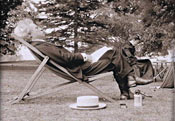
|
Mark Twain at Dolis Hill, England
|
A Connecticut Yankee in King Arthur's Court
Camelot
"I am an American. I was born and reared in
Hartford, in the State of Connecticut—anyway, just over the river, in the
country. So I am a Yankee of the Yankees—and practical; yes, and nearly barren
of sentiment, I suppose—or poetry, in other words. My father was a blacksmith,
my uncle was a horse doctor, and I was both, along at first. Then I went over to
the great arms factory and learned my real trade; learned all there was to it;
learned to make everything: guns, revolvers, cannon, boilers, engines, all sorts
of labor-saving machinery. Why, I could make anything a body wanted—anything in
the world, it didn’t make any difference what; and if there wasn’t any quick
new- fangled way to make a thing, I could invent one—and do it as easy as
rolling off a log. I became head superintendent; had a couple of thousand men
under me." - Hank Morgan
Slow Torture
"Straight off, we were in the country. It was the most lovely and pleasant
in those sylvan solitudes in the early cool morning in the first freshness of
autumn. From hilltops we saw fair green valleys lying spread out below,
with here and there, and huge lonely oaks scattered about and casting black
blots of shade; and beyond the valleys we saw the ranges of hills, blue with
haze, stretching away in billowy perspective to the horizon, with at wide
intervals a dim fleck of white or grey on a wave summit, which we knew was a
castle. We crossed broad natural lawns sparkling with dew, and we moved
like spirits, the cushioned turf giving out no sound of footfall; we dreamed
along through glades in a mist of green light that got its tint from the
sundrenched roof of leaves overhead, and by our feet the clearest and coldest of
runlets went frisking and gossiping over its reefs and making a sort of
whispering music comfortable to hear; and at times we left the world behind and
entered into the solemn great deeps and rich gloom of the forest, where furtive
wild things whisked and scurried by and were gone before you could even get your
eye on the place where the noise was; and where only the earliest birds were
turning out and getting to business with a song here and a quarrel yonder and a
mysterious far-off hammering and drumming for worms on a tree trunk away
somewhere in the impenetrable remoteness of the woods. And by and by out
we would swing into the glare.
About the third or fourth or fifth time that we swung out into the glare-it was
along there somewhere, a couple of hours or so after sunup-it wasn't as pleasant
as it had been. It was beginning to get hot. This was quite
noticeable. We had a very long pull, after that, without any shade.
Now it was curious how progressively little frets grow and multiply after they
once get a start. Things which I didn't mind at all, at first, I began to
mind now-and more and more, too, all the time. The first ten or fifteen
times I wanted my handkerchief I didn't seem to care; I got along and said never
mind, it isn't any matter, and dropped it out of my mind. BUt now it was
different; I wanted it all the time; it was a nag, nag, nag, right along, and no
rest; I lost my temper and said hang a man that would make a suit of armor
without any pockets in it. You see I had my handkerchief in my helmet; and
some other things; but it was that kind of a helmet that you can't take it off
by yourself. That hadn't occurred to me when I put it there; and in fact I
didn't know it. I supposed it would be particularly convenient there.
And so now, the thought of its being there, so handy and close by, and yet not
get-at-able, made it all the worse and the harder to bear. Yes, the thing
that you can't get is the thing that you want mainly; everyone has noticed that.
Well, it took my mind off from everything else; took it clear off, and centered
it in my helmet; and mile after mile, there it stayed, imagining the
handkerchief, picturing the handkerchief, and it was bitter and
aggravating to have the salt sweat keep trickling down into my eyes, and I
couldn't get at it. It seems like a little thing on paper, but it was not
a little thing at all; it was the most real kind of misery. I would not
say it if it was not so."
-Hank Morgan
|
|